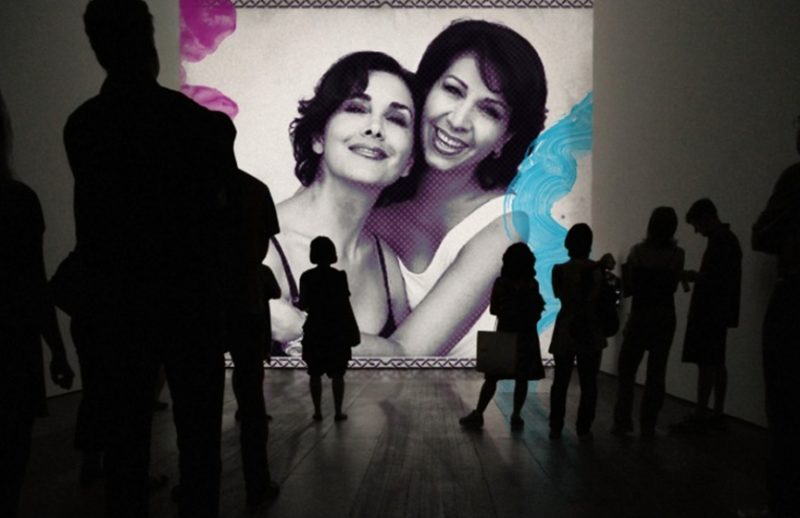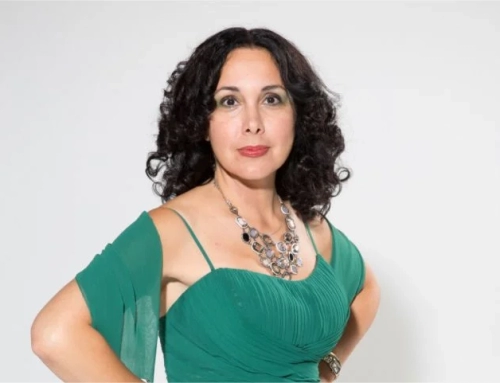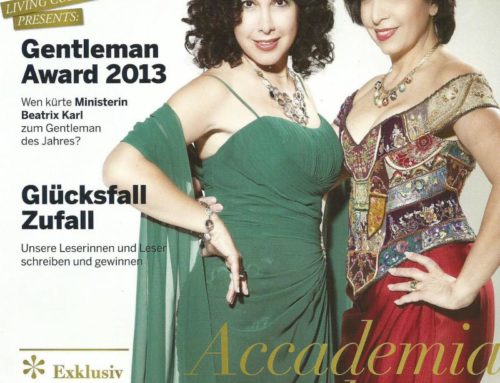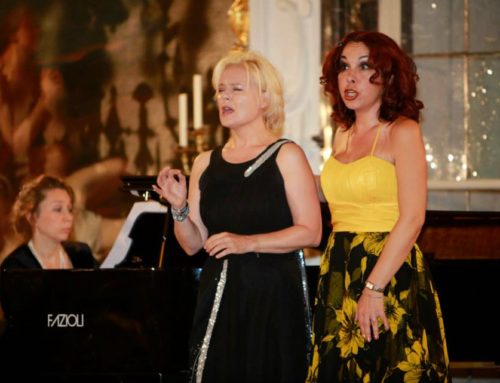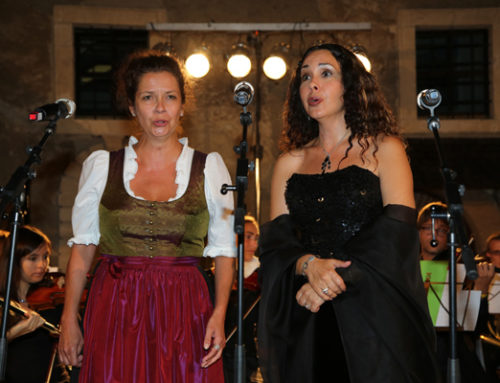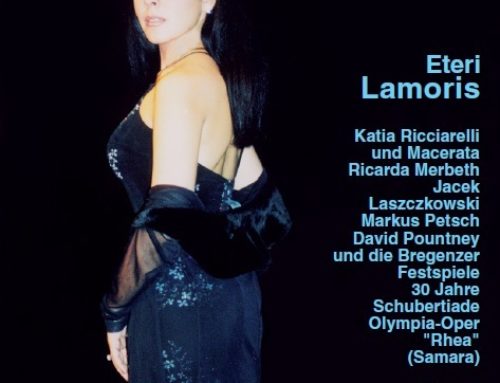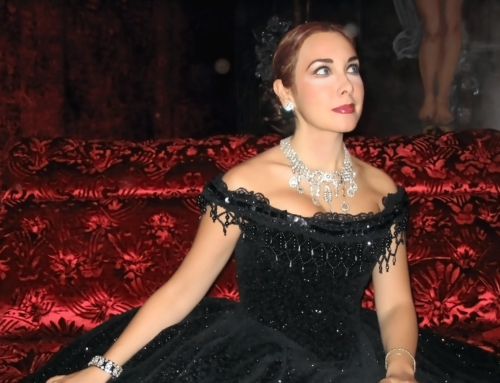Eteri Lamoris (soprano)
interview for „Art of life“ magazine
(translation from spanish)
I guess that this is not the first time you’ve been asked this question: how many years have you practiced your vocal art?
Lets start off by talking about who I started practicing with. My mother, Lamara Chkonia, is still remembered in the former Soviet Union as a very famous singer and a National Artist of the USSR. Without a doubt she played the major role in my becoming professional. She started to teach me singing when I was three. At ten I sang Rosina‘s aria for my family. So I was psychologically and professionally ready for the stage when I was rather young, although my physical development wasn’t as advanced. At seventeen I panicked, sensing how fast time flies, I was in such a hurry, but couldn’t help myself, since my voice was still of a child and not fully developed.
Certainly you’ve gotten this far due to your hard work, and your scenic and vocal talents. But don’t you think that luck plays an important part in an artist‘s life as well?
Sure, but my greatest luck was to be born precisely into the family where I was born and where I grew up.
And who else do you have to thank for your success?
There are a lot of people who have played a priceless role in my life. Pianists, singers, conductors and even my schoolmate, who has nothing to do with music. There were people who supported me when I needed it most. I can’t name all of them. I would like to say that I am very grateful that fate is constantly giving me chances to meet extraordinary people who enrich my life by communicating with me. I think this is the most wonderful gift that life can give to a person, besides a family and a job.
How come?! The very next day after the concert the photos of you and the German Chancellor hugging each other were on the front pages of newspapers.
Well, everybody else but me was on the front page… I wanted to change my dress so badly… And, after such spiritual pleasure my soul didn’t want to take part in any insincere official gatherings. Anyway I think that music is beyond politics, although politics has always affected and continues to effect the lives of musicians.
You break the stereotype of female opera singers who always stand out by their excessive weight.
Well, that is not exactly true. There are more and more opera singers of my type. It’s just when you see a «balloon» on stage instead of a feeble Violetta, it shocks the public and stays in their memories for a long time.
How do you take criticism? Do you agree that it plays a positive role in a musician’s life?
Definitely, but everything must have a honorable tone. Bacon once said: «People with many flaws first notice them in others.» Excessive criticism to me is a sign of provincialism, especially when the good is left unnoticed. Performing art is very tricky and it is virtually impossible to be perfect in every respects, especially when you are talking about such a fragile instrument as one’s voice.
What type of roles do you prefer to perform, what are your favorite characters?
I don’t like weak characters with little personality. However, I like the Desdemona part very much, probably because «Otello» is one of my favorite operas.
What parts would you like to sing besides those that you already sing?
Tatyana from «Eugene Onegin», though I understand that this part will be best for me in 10-15 years. My current characters are Violetta, Lucia, Manon, Elvira, Juliette, Nedda etc.
What can you say about the role of a teacher in a singer’s life?
A teacher’s role is priceless, especially at the beginning of the road. In order to find your own style it is important to listen to your intuition and your fantasies, and listen to records. My mom played a huge role in my life. Sometimes unsuccessful singers overestimate the role of a teacher, blaming him or her for all of their misfortunes. It’s silly, since even the most ingenious teacher can’t help you if you were born with a «sound defect» or you have «non-vocal thinking.»
Do you consider yourself more successful than your mother and how do you compare her singing career with yours?
Lamara Chkonia had a rather difficult climb to her success. Eventually she became very popular throughout the USSR. The communist system in Moscow did everything possible to limit the career advancement of ethnic minorities and Jews, and as she was both, this made it particularly difficult for her. Of course Russian musicians were also affected by the Soviet system, though their problems had nothing to do with ethnicity.
For many opera singers singing is their purpose in life. What does it mean for you?
To me singing is a tool for self expression and a way of having a spiritually rich life. It’s a lot. The purpose in life I see as children.
What is the happiest day of your life?
The day my daughter Ana was born.
What do you think needs to be done to attract youth to opera?
Well, it’s impossible just to take young people and attract them to opera. Love for opera needs to be planted from childhood. You could compare it to an exquisite delicacy, the taste for which cannot be appreciated at once. Also it is important what opera was first heard in childhood and who sang it. By the way, interest in opera is growing in the world, including among young people.
What quality do you appreciate in people? What do you despise?
I love inherent magnanimity, the ability to understand and to forgive. I don’t like cruelty, prejudice and hypocrisy.
What advice would you give to novice singers?
To change their occupation as soon as possible.
Is it a joke?
Yes and no. I think everybody has to think hard before dedicating his or her life to this profession. This is a very hard road and in the case of failure you risk being traumatized forever.
Then why did you choose this road for yourself?
I didn’t have a choice. To explain this I need to look back to the past. During my childhood and teenage years I liked everything but singing: painting, cinematography. I played tennis at a serious level, played for the country’s collective youth team. At some point my parents got scared that this could interfere with my singing, so they banned me from playing.
My classes with mom would often end up in spasmodic hysterics. Everything seemed to be so difficult and I often doubted the necessity of these classes. But my mom kept obsessively proving to me that I was very promising. When I was in the third year of studying at the Conservatoire I decided to quit singing and started preparing very seriously for a career as a psychologist. But once, when I went for a walk in the park with my mom and my daughter we started talking about singing and just for fun I decided to mock the way one of the opera singers sang. She had a very funny way of singing. And then all of a sudden my mom turned to me with an expression of amazement on her face: «What’s with your voice?!» I didn’t understand what she meant at that moment. «Remember this note and let‘s go home and try singing scales.» Well, I didn’t have to remember that note, because it had existed in me since the birth of my child. After I quit singing I didn’t suspect that I would get a new voice. Standing next to a grand piano for the first time after a long silence I was producing new, unusual sounds, and with sorrow I was saying farewell to my dream of becoming a psychologist. I see something of karma in this story …
Very impressive story. So, basically your daughter gave you your voice… Well, since we’ve gone that far, I have a very delicate question… Jose Carreras claims that love making is good for your vocal cords. Some singers don’t agree with him. What do you say?
Well, those that can literally «make love», as if it was some sort of gymnastics or tea-drinking, cannot hurt themselves… I just don’t like this phrase in general. The word «making» next to the word «love» sounds dirty. Love is a serious process. If love honors you with its visit, then, of course, the art can be affected.
If you had Aladdin’s Lamp what would you ask the Genie for?
Eternal life and youth for all honest people.
You give the impression of a rather serious person. How do you spend your spare time?
It is hard to judge a person just by the impression that person makes. You can do silly things with a serious facial expression, or you can smile when your soul is crying. Talking about my spare time – I hardly have any.
Are you an optimist?
I used to be an optimist during my school years. Now I accept optimism with my mind as a way of preserving my sanity. I’ll tell you more, even death I don’t consider as a tragic event. For some, death is a punishment, for some – it’s a reward and a beginning of new, maybe more perfect life.
What do you dread the most in life?
The inner emptiness. Here, in the Western World, it is so easy to lose your emotions to the crazy pace of life, abundance of gadgets, decorative beauty, excessive foods and entertainment. Here you can become a «fat cat» and stop in your development. That is why all masterpieces were created in poverty. I often recall the following words of Maugham: «The limitation of desires is no less passionate than submission to passions.» When I completely submit myself to life’s conveniences I find myself unable to work.
How did you meet Zeffirelli? In a couple of words, what is your experience of working with him?
Franco Zeffirelli! I can’t limit myself to talking about him in just a couple of words. He is an amazing human being. We met four years ago in Siviglia, when I was invited to the infamous Teatro alla Scala production of «La Boheme.» The part of Musetta was difficult for me because it required me to act the part of a promiscuous, easy woman who is quick to react, where as I’m naturally shy. But then Franco opened me up with just one phrase: «Give me the fire of a Georgian woman.» Then he turned to the whole cast and started talking about the passion of the Georgian people. I blushed up to my ears and felt responsibility for my nationality. At the premier I gave everything I had. A year later I was called up and told that Zeffirelli wanted to see me in his performance in Naples at Puccini’s anniversary. There he proclaimed me the best Musetta he’d ever seen. After that I was invited to take part in his productions more than once.
Another reason why I’ll remember the productions in Naples for my whole life is that I celebrated New Year at his mansion near Naples where he invited a lot of his friends. His servants accommodated me in one of his private residences right on the shore with an ocean view, overlooking an island with a villa which had belonged to Nureyev. It was so beautiful… Everything, starting with the interior decor and the way Franco addressed me had a 19th century atmosphere: «How did my princess sleep?», «Bring some wine to my princess!” Franco has an amazing ability to be in tune with another person‘s soul at a distance, he doesn’t even need words.
However, Naples has left me with not all pleasant memories. The management of the Naples theater tried to arrange their own candidate for the part of Musetta. They sent me a rejection note and informed Zeffirelli about this. Franco gave them an ultimatum: «Either Lamoris comes or I leave!» I took the last flight there and had just enough time to be at the recital. Obviously, this was an outstanding move on the maestro’s part. Usually, famous people in our world are big time-servers and «politicians». I think that getting along with everyone doesn’t necessarily mean you are smart. It’s only a ruse. Being extraordinary is an ability to express yourself even if somebody might not like it. Before my departure I came to his dressing room to thank him for his support. He said: «No, not me – your talent is your support.» I closed the door behind myself and finally cried. I just really wanted to believe what he had said.
We know that you did a lot of work with famous Russian musicians, such as Gergiev, Bashmet, Spivakov, Kisin… What did these people teach you?
We have a few joint projects in the pipeline and I hope we’ll get to perform together. He is a very fulfilled person. When we met the last time at a festival in Holland he impressed me not only as a very talented musician, but as an extremely intelligent professional, who knows what to do and does it in a very beautiful and convincing way.
During the last five years I‘ve worked most often with Yuri Bashmet and we have developed a very nice friendly relationship. His orchestra is like his second family. It’s always a pleasure to perform with Yuri (we had about ten joint performances throughout Europe), since his joyful nature and easy-going personality are sensed by his orchestra and partners on stage.
Vladimir Spivakov and his «Virtuosos» were idols for me during my childhood. I remember the awe I had when I watched his numerous performances on TV when I was 15-16 years old. Could I ever imagine that I would get to know him and even participate with him at the famous «Menton Festival”. Imagine this; a two-week tour on a huge cruise ship with concerts by the world’s most famous musicians performing in France, Italy, Greece, Cyprus, Malta, Israel, Turkey, Egypt… Daniel Barenboim, Barbara Hendricks, the Yuri Bashmet Orchestra and many others performed at that festival. I sang two performances with the Yuri Bashmet Orchestra, one of which took place in Jerusalem.
I called Eugeniy Kisin just «Jenia» when we were very young and performed at the Ostashkovo Festival. My recollections are mostly connected not to the profession, but boating on a lake, walks in the forest, friendly dinners and the numerous anecdotes that he told. Since then he has visited Madrid and Vienna, but unfortunately every time he came I was on the road …
Who among your stage partners besides impressed you the most?
Unforgettable memory is meeting Carmen – wonderful mezzo-soprano Denyce Graves. Extraordinarily limber, sensational, with sex appeal and so emotional. A real gypsy temperament, I often remember her. I sang the part of Micaela.
Do you have a professional dream?
Once I dreamed of recording an album of love songs in Frank Sinatra style. I like my easy-listening type of music voice a lot. I dreamed of being filmed in a movie and I still dream about it.
Do you have a motto that justified itself the most?
Now I do, purely professional. It is an ability to distinguish between the important and the secondary, and treat the important as if it were secondary. I think that the role of a profession in our lives shouldn’t be overestimated, no matter how important it is for you. In any event it is better than tying a warm scarf around your own neck and depriving yourself of ice-cream for years, thinking about what a great deed you are doing for mankind.
What quality should a singer posses to sing well?
A singer should have a mind and a soul, because the voice is actually not the one who sings. It is important to plant in yourself the most honorable feelings, not changing yourself for pitiful intrigues. Timbre is the soul. The more beautiful the soul the more beautiful and free the sound is. It is impossible to be peevish and at the same time sing at a good level the magnificent aria of Rodolfo from “La Boheme” or Lucia from “Lucia di Lammermoor”.
Do you consider yourself a happy person and what does happiness mean to you?
Someone once said that a person is never as happy or unhappy as it seems to that person. Not long ago I was at the funeral of a famous Spanish film director Pilar Miro who died unexpectedly of a heart attack. I used to know her. Just a few days before she died I saw her laughing… After the sermon, my friend said wisely, with his natural Spanish ease while patting me on my shoulder: «Oh, Eteri! The most important thing in this life is to find happiness. However, it is of no importance what brings you happiness, whether it’s work, hobby or personal life…».

